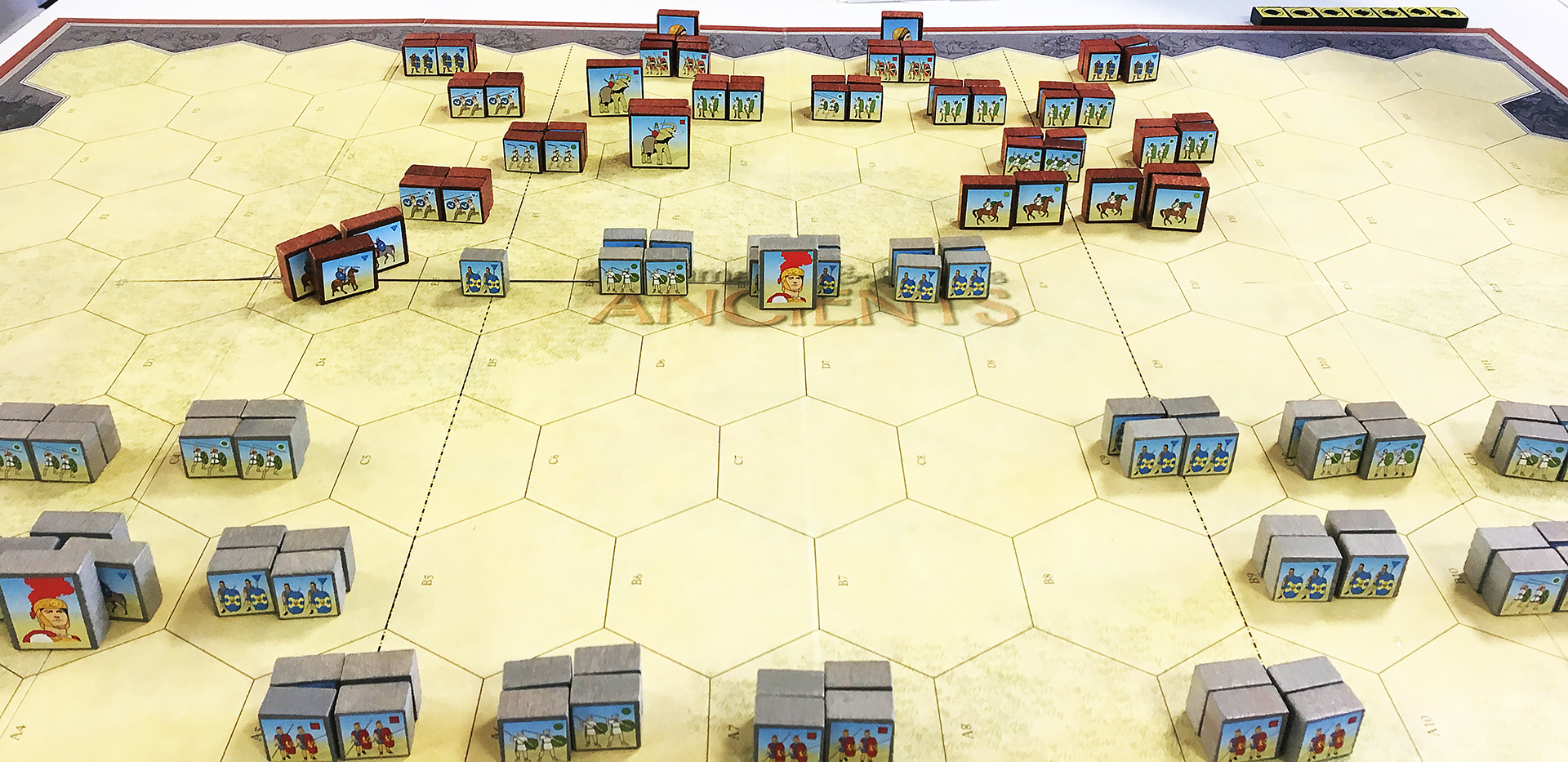
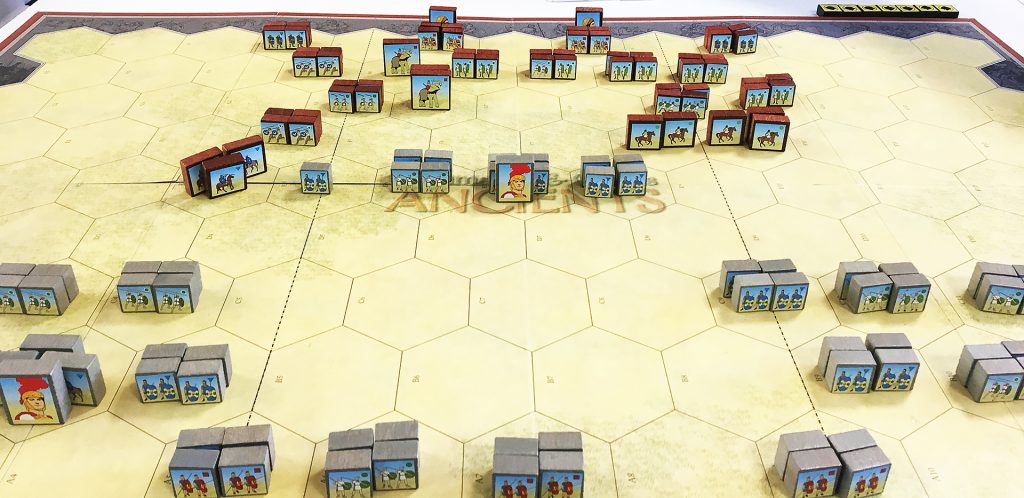
With the onset of the coronavirus pandemic, the chance to meet friends and play board games face to face disappeared overnight. However, technology is there to help us out and it’s possible to play games online. Let’s consider some definitions and get a manageable scope.
I’m not going to consider computer games, that is, games designed specifically for the computer. When they first appeared, they were simple, and usually played against the computer. Games now routinely involve many players signing in and playing together in teams or as individuals, with or against other players (Massive Multiplayer Online Games or MMOs). The computer games industry is huge – in South Korea, a spectator sport with top players going professional.
I am going to look at board games, but this is a huge and diverse area. There are very many types. I not going to cover children’s games or family games, nor am I going to cover abstract games like chess and backgammon, or even good recent additions such as Azul. What I’m interested in here are games that take inspiration from a theme and I split them into two – wargames, and what are commonly referred to as Euro-Strategy games.
Board Wargames Online
Board wargames are the obvious place to go for those who like wargames, with the proviso that the reason we use miniatures is that bits of cardboard don’t do it for us.
From my brief foray into this area, it looks like Vassal is the go-to software. It is old school and the interface shows its age, in style that is, though it is quite useable. First go to the website and create an account and log in. You have to download the Vassal Software and separately download the modules you want. It is all free.
http://www.vassalengine.org/index.php
Go to the Download Tab and choose the software you need; it offers Linux, Mac OS X and Windows and against Other Platforms it says “…In order to run Vassal you will need to obtain a JRE for your OS” (Java Runtime Environment).
I am a Mac user. The download process was very simple, the software landed on my computer and was installed like any other software. I had to override the security block I have on running software from unknown sources (use ctrl+click then “Open”).
What you have at this point is a shell; an application that provides the game playing environment.
The next thing to do is look for the game you want. The next tab along on the Vassal Web Site is Modules, there are hundreds of modules that allow you to play the named game. You browse by number/letter of the alphabet, search for specific games by name or list by manufacturer. You can go for any of the huge number of hex and counter games that are listed, but there are also many others such as Arkham Horror, Twilight Struggle, Simmonds’ Napoleon at Marengo and Austerlitz and GDW’s A House Divided to name just a few that use different approaches.
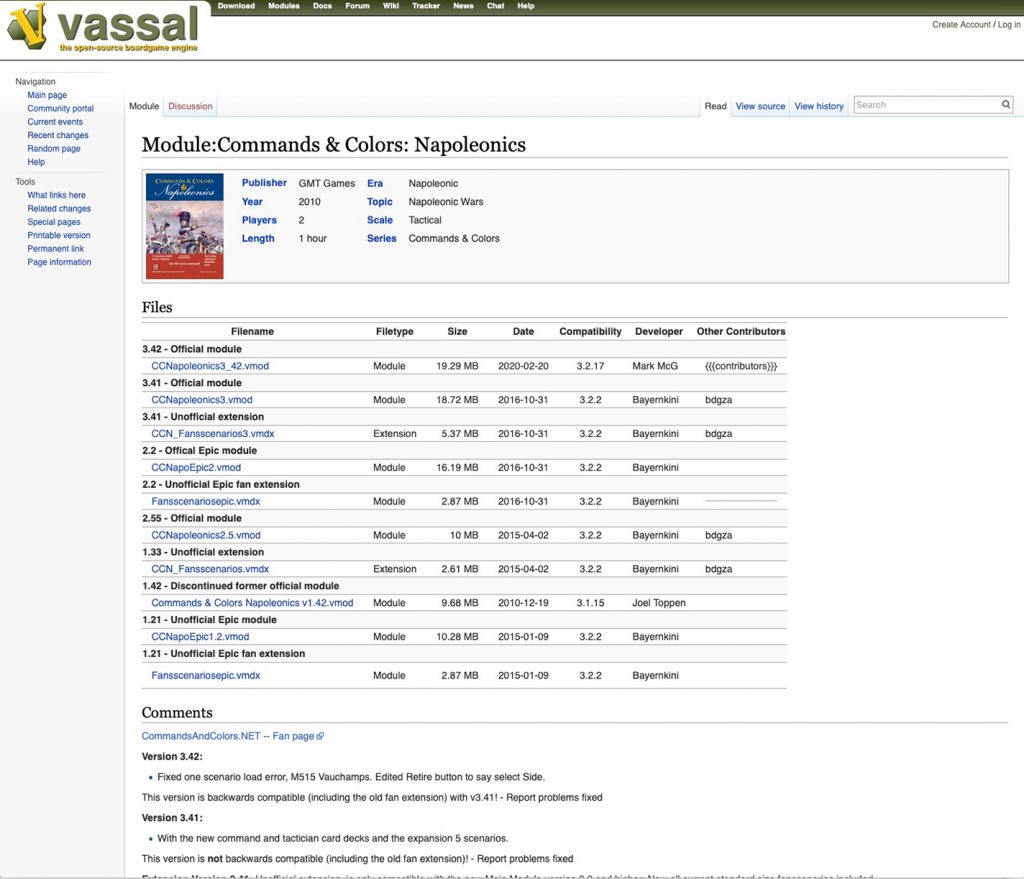
I found Commands and Colors Napoleonics which I know inside out and play regularly. There are several versions, I just picked the latest (3.42 when I did it). I tripped up on a small thing: the modules come as .vmod files. In Windows you can click on the file. On a Mac doing this delivers an error message box saying that the module cannot be imported. On a Mac you need to use Vassal to do this. The top menu lists Vassal, File, Tools and Help. Select Tools and there is a drop down with Open, Edit, New and Import. Ignore Edit, New, and Import – these are for enthusiasts who develop game modules. Use Open, which will both import the module into the Vassal software and load the game in a separate window. It will ask for your real name and a password – this isn’t the same as the account you set to get on the website, it is specifically for this game.
Next time you want to run the game you click on the entry in the Vassal module library and it launches the game. You now have some drop-down selections to make – start a new game offline, look for a game online or load saved game. Whatever you pick the next choice is select setup. This gives you a list of the Commands and Colors Napoleonics scenarios, so pick one and choose to be the observer, Allies, French or Solitaire. Another window opens – this is the playing area. At the top is a menu bar, a log of every move/step, which is of course blank until you do something, and the playing area/board. You can play peer-to-peer or on the Vassal Server. I found it easiest to create the game, find my opponent and run it on the server.
My regular opponent and I are working our way through the full set of expansions, in between using figures and playing other periods. We have completed British/French Peninsular, the Russian and Prussian expansions and are half-way through the Austrian one. Using Vassal we just picked up where we left off after the club shut down and loaded the next scenario for Eggmühl 22 April 1809 – Day 2.
I strongly urge you to use the Vassal tour which is the only module you will have when you first load the software. This will tell you the peculiarities of how the software allows players to find opponents.
The first thing to be aware of is that none of these games is automated – you have a shared area online to toggle between you and your opponent, but aside from some admin and dice throwing, you have to drag and drop counters. There is always a pull-down menu for Counters with the actions you can take, but it’s up to you to know what they mean and when they are to be used. You need to go to your “System Preferences”, find “Mouse” and switch on “Secondary (right) Click” to get the pull-down menus if you haven’t already done this. Don’t forget to end your turn using the button at the top to let your opponent take over – you’ll see what s/he does on the log, but not the details. You will see the results on the board/map.
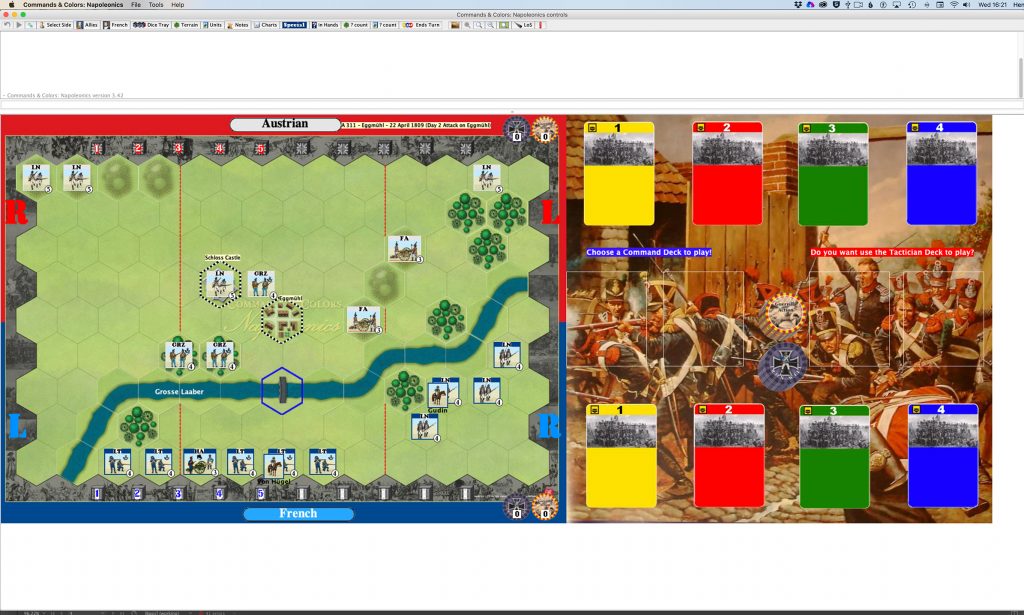
As to Commands and Colors the board looks as you’d expect. The little number at the bottom right of each counter is the number of blocks represented.
At the top and bottom of the board is a track for recording progress – you don’t get victory banners when an enemy unit is eliminated: simply drag it to the right place on the victory track. To the right of the map there is an area for the command and tactics cards and the areas for placing cards when a unit is in square.
The dice throwing is well supported – you click on the number of dice and up they come with the right symbols. Cards must be drawn. To play a card you actually use the discard option which moves it to the discard pile so you can action it.
A small glitch: the special counters seem to have got stuck on ‘Guerrilla Action’ and ‘Iron Will’ – but since you know if they should be ‘Battalion Mass’ or ‘Mother Russia’, it is easy to use these and work around it.
Euro-Strategy board games online
I have been playing board games with a group of friends since 1984. We wanted a way to carry on our regular Thursday night game session and decided to use technology. We had a quick look at what is available and tried what seem to be the top three: Tabletop Simulator, Board Game Arena and Yucata.
What we did
First, we set up our iPads to run Skype and got a multiple call going, then we simultaneously played a game online on our computers. All systems involve setting up the game and inviting your friends/buddies to join. The easiest of these, for me, was Yucata.
Why do it that way?
We wanted to recreate the feel of playing face to face; that’s why we have stuck to board games all these years and it is interesting to see their recent resurgence – the rest of the gaming world is actually catching up with us.
Games need as large a display as possible – they have many elements and it helps to be able to see everything on the screen (especially at our age and with our eyesight). Running Skype and a game side by side would take up display space, so using two devices eliminates that and any other bandwidth contention issues that might arise. It means we didn’t have to worry about switching between the Skype camera view and the game view.
The use of Skype seemed obvious to us and I feel sure others must be doing this, but it is also clear that many online gamers seem perfectly happy with the anonymity and odd user names. I guess that is the real difference between friends playing face to face and an online free-for-all.
There are two very different approaches and experiences to report on here. Tabletop Simulator provides an analogue of the real world, whilst Board Game Arena and Yucata provide semi-automated games. Yucata’s website extension is .de (it is German). This is good news, because the German board games industry is huge. The site has licenced versions of many games and there is some overlap with Game Board Arena (Puerto Rico is on both, for example) but they also have a lot of different games. If you can get to grips with Game Board Arena you will have no trouble with Yukata.
Our trial wasn’t without incident. Here are the first Impressions, based on a few hours’ trial giving the comparison of Table Top Simulator vs Board Game Arena/Yucata to play board games.
Two very different approaches
Tabletop Simulator
https://www.tabletopsimulator.com
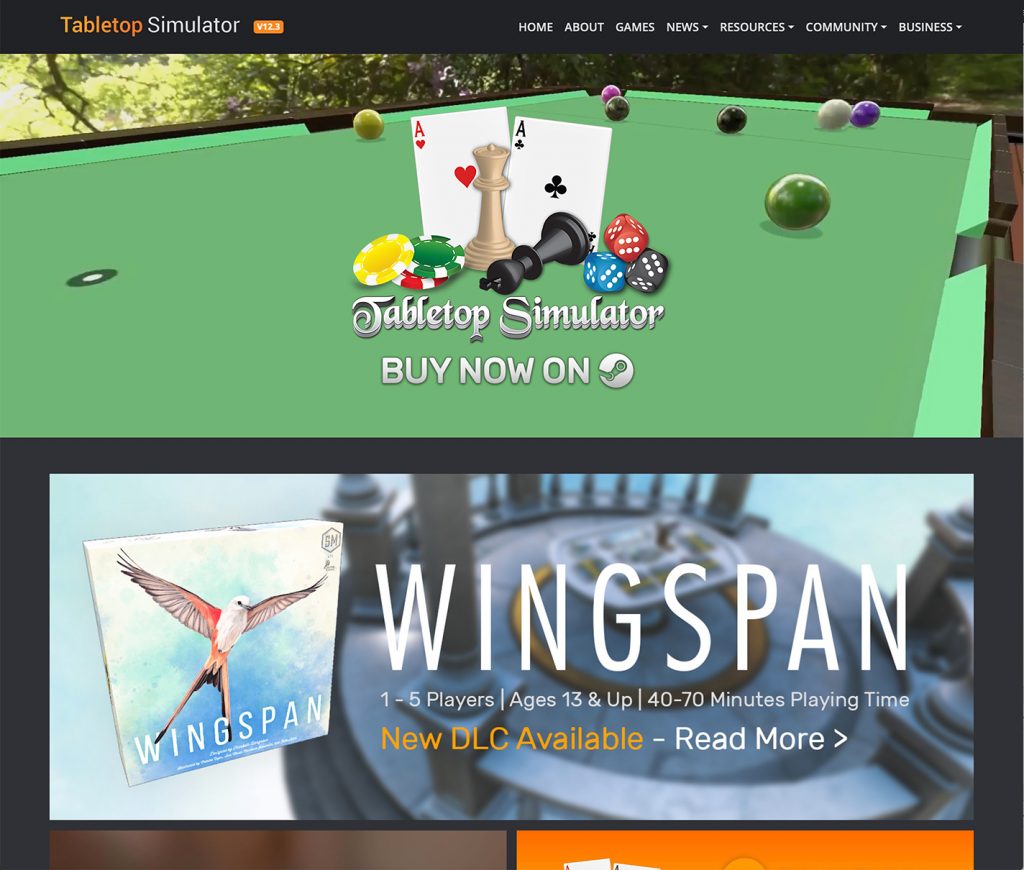
This is not so much a game as a game environment that runs other games, so you could describe it as a meta-game; the authors describe it as follows:
Create your own original games, import custom assets, automate games with scripting, set up complete RPG dungeons, manipulate the physics, create hinges & joints, and of course flip the table when you are losing the game. All with an easy to use system integrated with Steam Workshop. You can do anything you want in Tabletop Simulator – The possibilities are endless!
TTS provides a full analogue way of playing table top and board games. Some games are available and you can use these, you can copy and modify these games or even create your own.
There are no rules built in: you play as you would at a table – you select and lasso pieces and drag and drop them. There are controls for magnifying, rotating, flipping and inspecting pieces – these controls are the same(ish) as the controls that are built into many computer games.
To get started you need to use Steam (https://store.steampowered.com), so if you are not a Steam user you’ll have to install this first. Then there is a tutorial where you play a simple game called Don’t Stop. After that you need to download a game you fancy and start playing. Some games are free, others have to be purchased.
Ethos and Philosophy
TTS has been set up to make the look of the game on screen exactly the same as if you were playing on a tabletop and within that environment, you can pretty much do your own thing.
Because it is downloaded, it runs as fast as your device, so if you have a reasonably modern PC or laptop this will run just fine.
Board Game Arena and Yucata
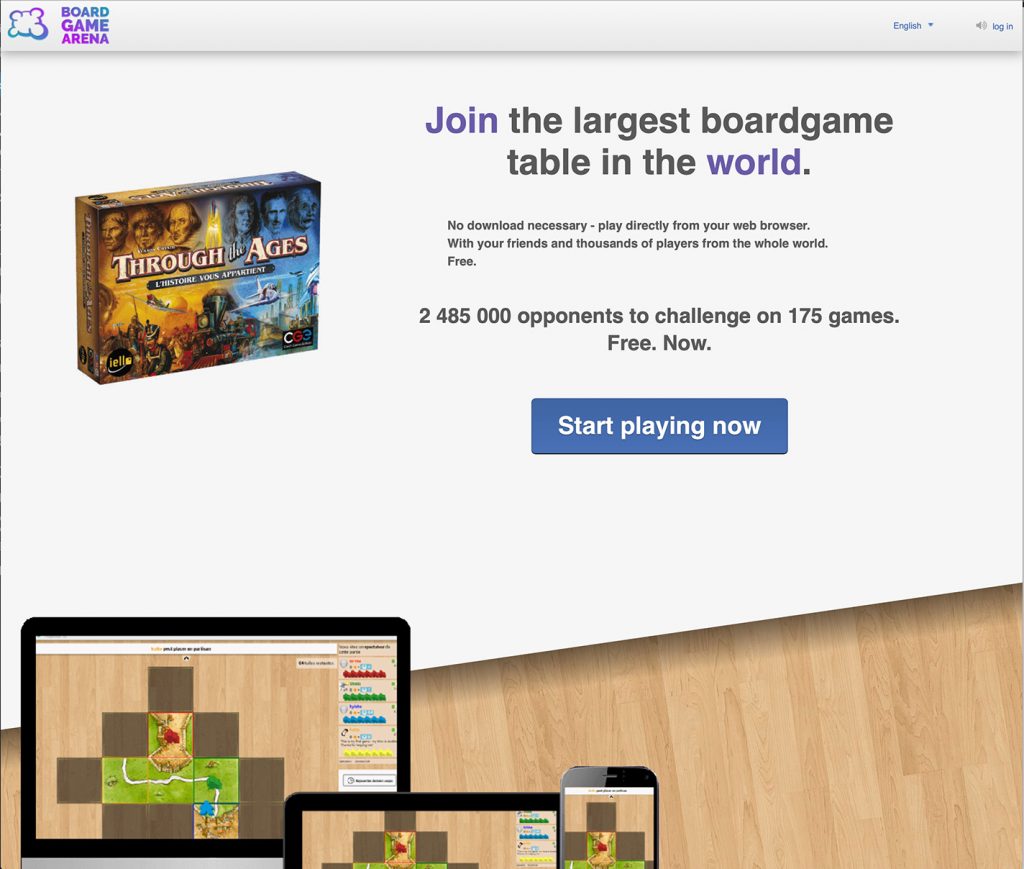
These are online game playing communities.
- BGA top menu; play now, news, games, competition, community and forums.
- Yucata top menu; overview, games, other players, communication, my yucata and info.
In both you get access by creating an account. Sign up, do a bit of familiarisation with the site, select a game, find opponents and start playing.
There are automated versions of many well-known boardgames. You don’t own or download a copy of the game – the game runs remotely on a server somewhere and you access it via your browser. If you are the host, you can elect to play with friends and invite them or you can just wait for online people to join in, and they will.
The games are interpretations of the board game adapted to run online. This means they may not be exactly as they appear out of the box but they will be close. This means that many of the obvious rules are built in, so if you try to do something that is not allowed, you just won’t be able to do it.
You can see the results of other players’ moves and a summary of their position, equivalent to what would be on the table in front of you – you get all the detail of your hand.
BGA offers both a free and premium service. Premium is £2 pm. This allows you to get online when demand is heavy and you also get access to more games and stats. Yucata is free.
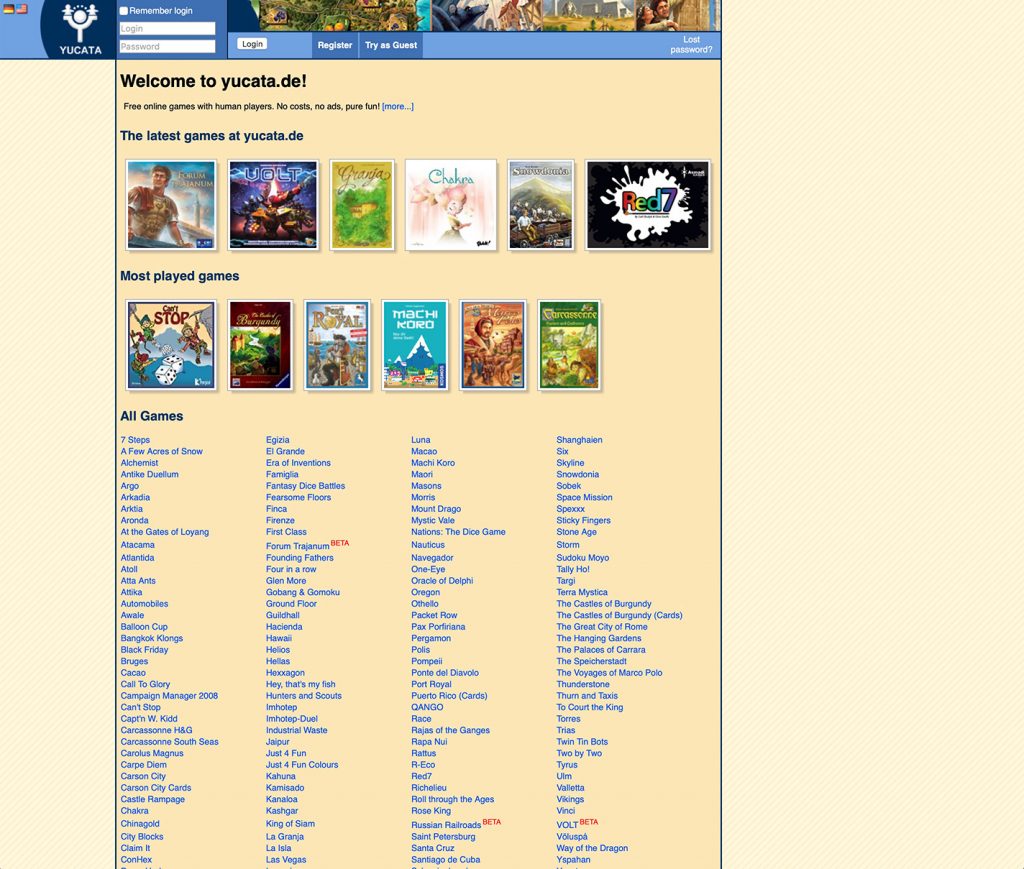
Ethos
Just sign up and play against anyone who is out there and into games – competitive games and tournaments as well as casual games. Because it is a forum, in BGA there are rules for politeness and if you drop out of a game, that is running the risk that you get marked down for spoiling it for others.
Because they run on servers, they can slow down at periods of high demand.
Two very different experiences
Tabletop Simulator
We used TTS at first because at the time we wanted to play, the servers were running slow due to high demand, so new account sign-up had a two-hour delay. The download of Steam and of TTS via Steam was seamless. It was easy to get into the tutorial and play Don’t Stop against a bot.
Figuring out what to do after that was not easy. Unless you have previous computer gaming knowledge, you are just left in a strange place where, because you can do anything, you don’t actually know how to do anything! Just setting up names and invites and starting the game was trial and error. There is even a YouTube explainer by someone called What They Don’t Tell You. We were lucky: Chris had invested some time and tailored a version of Puerto Rico for three players, but even now, I couldn’t repeat the process of starting and joining a game on my own.
The game play was cumbersome. Every individual action is done manually as an analogue of what you do at the table – it might be OK when you are familiar with computer game controls, but it represents a hurdle to those who aren’t. We had successfully, albeit slowly, played Puerto Rico to about halfway through when Doug managed to tip up his board and scatter all the pieces. He didn’t know what he did wrong: we tried the rewind time feature, but either it didn’t work, or we were doing something wrong. In the real world, I’ve been known to spill a drink on a game (alcohol dissolves the carboard/paper glue by the way), but this is taking the analogue one step too far! We couldn’t get the board back and had to abandon the game.
Board Game Arena and Yukata
We got up and running very quickly and started playing a game we know straight away. The games run in real time or are turn-based. We chose turn-based. The game play was fast and playing a game we all know was easy.
Because we were Skyping at the same time, we could help each other out; some actions you just do and control passes to the next player, but some require several things to be done, so you have a confirm button to say when you’ve finished – forgetting (or just not noticing this) is easy until you have done it half a dozen times, which you will do in 5-10 minutes of play.
When we’d had enough (as the song goes, After Midnight), we just left the game in progress, expecting to pick it up next week. Next day, I found an email alert that it was my turn and I had two days to complete it. At this point, we keep it going as a background activity or arranged a get-together to play on (which we did on Saturday afternoon). We also tried the real-time option. In this mode, you just play the game to a conclusion in a single session, but you should note there is a countdown timer.
Rookie errors
On BGA, I unintentionally managed to set up a game that people I didn’t know joined; when I left this (dropping out of the game in progress) I got bad karma points (for spoiling other people’s experience), so now have a bit of a bad reputation – but this does seem to be fading away. Yukata seemed a bit easier in some respects. It seemed easier to limit a game to friends and not have random strangers joining in.
Using both of these systems, you will need to keep deleting all the email notification you get, so if you are lazy with housekeeping, your mailbox is going to fill up fast.
Conclusions
Vassal
For one-on-one games where you know how to play already, this is more than adequate; it is a good substitute. There is a bit of a learning curve around the interface [I confirm this – it’s ghastly! Ed], various pop-up screens and mouse controls. But if you have your opponent on Skype (or just voice), you can talk it through just as you would face-to-face. The glitches we found in Commands and Colors could be worked around. With my regular opponent on Skype at the same time, this will be my Wednesday evening wargame for the duration.
Tabletop Simulator
For us, this was a big fail. Life’s too short, and this is too clever by half unless you are both a board gamer and computer geek. For us, the difficulty of the learning curve was greater than the time we were prepared to put in – all we want is ‘plug and play’. Unless one of us agrees to be pathfinder and coach, it is not really our thing.
However, if I was so inclined, I can see how you could actually do a tabletop wargame on this platform.
Board Game Arena and Yucata
A success: the games are close approximations to the original board games, it is easy to use and what you have to learn is not technical. With the gang on Skype at the same time, we will be using these sites for our Thursday evening game sessions from now on for as long as we have to. And, as none of us is getting any younger, maybe when it is icy or foggy after this has all died down!
Brian Fish, April 2020

I would recommend Vassal for wargamers – if you are happy to use a top-down paper soldier approach it can work really well – there is a good DBA module on there – and I’ve had a go at creating my own game as well – I blogged about it here: https://marklord.info/2017/03/16/creating-virtual-miniature-wargames/
Thanks Mark – happy to recommend your link.
Thanks Henry – heard about the blog post while listening to your pod with Annie Norman – some really good advice as usual!!
Glad you enjoyed it – Annie makes it easy!
There are also some great computer games out there. I’m very fond of the games made by John Tiller Software. They can be played by email or, if you can set up a connection, computer to computer.
Thanks for the suggestion, Joe.